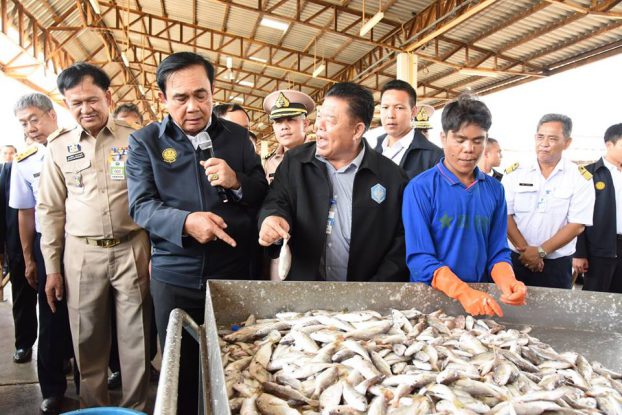Thailand’s Prime Minister Prayuth Chan-ocha met on Monday with Burmese workers at the port of Mahachai, just outside Bangkok, where thousands of migrants are employed in the seafood and fishing sector.
A government delegation led by Prayuth visited the offices of the Labor Rights Promotion Network (LPN) to hear first-hand accounts of issues facing migrants at the seaport, including a lack of documentation and exploitation.
“The prime minister spoke for one hour with representatives of factories and the fishing industry,” said LPN spokesperson Surachai Mintun. “We mainly reported about the issues facing migrant workers. First, the children and dependents of migrant workers are not documented. In order for them to be entitled to education and healthcare services, the Thai government must grant legal residency status. Second, it is very difficult for foreign workers to obtain identification cards, and when they do apply, they are invariably overcharged.”
Surachai told DVB that migrant fishermen are frequently threatened by Thai authorities and bosses if they raise their concerns.
The LPN spokesman said that his group had received financial assistance from the Japanese embassy to build a shelter for abused workers to temporarily reside while legal proceedings are ongoing.
Prime Minister Prayuth pledged to provide three million baht (US$100,000) to LPN to help the NGO resolve such issues. He later led the Thai government delegation on a tour of seafood factories and the One-Stop Service Center in Mahachai which is responsible for issuing identification cards to undocumented workers.
The prime minister reportedly chided staff at the Center for delays in issuing ID cards.
[related]
Thailand’s multibillion-dollar seafood sector has come under international scrutiny in recent years after investigations showed widespread slavery, trafficking and violence on fishing boats and in onshore processing facilities.
An estimated two to three million Burmese work in neighbouring Thailand, mostly illegally. Aside from the fishing and seafood industries, the bulk of Burmese work in rubber plantations, construction sites, agri-businesses and as domestic staff.
ALSO TODAY: ‘Progress and persistent abuses’ in Thailand’s fishing industry, says ILO



